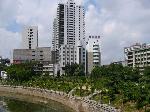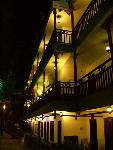- Getting around Lijiang. Dont stay in the Old Towns more than 2 days, there is nothing to do. KRISS Oct 9, 2013 05:46
- 2013 Beijing Temple Fair BENNYLAU Feb 26, 2013 03:29
- Malaysian traveling from KUL - LAX vis Shanghai PVG ZATI_DY Jan 3, 2013 20:15
The Verdant Land
- Views: 3527
- |Vote: 0 0
- |Add to Favorites
- |Recommend to Friends
Into Guangxi
When Bill Clinton visited Guilin during his presidency, he called Guangxi Province 'the most beautiful place on Earth', and when I pulled aside the curtain of my Nanchang - Nanning train window early in the morning en route for the provincial capital, I began to wonder if he might well have been right.
Train journeys through China are an essential part of getting to know the country, as it's from the windows of trains that visitors can see much more of China than they would in the city centres where they alight. When I poked my head through the curtain to see where I was at 7.15 in the morning, I was surprised to see that the train was sitting in the Guilin railway station - a place I've been wanting to see in China for a long time. Guilin, with its landscape of softly rounded giant peaks dotting the bright green plains of rice paddies and twisting streams of clear, black water, is one of China's most charming sights and for many the most memorable visit on a tour around the nation. I wasn't going to stop in Guilin on this trip, but I was most grateful for this unexpected opportunity to see the area this way - passing through on a southbound train.
The beauty of Guilin was undeniable and as I watched it pass by as the train once again set out for the south, I was transfixed by the procession of old buildings overgrown in lush vegetation. Guilin seemed to be carpeted in green, and even the grey peaks poking up at the edges of the city proper were drizzled in bush and grasses. I made an ultimatum to return to the city as soon as possible - most visitors enthuse about the voyage along the Li River in the shadow of these extraordinary mounts, and although said to be one of China's more expensive boat rides, I resolved to make preparations for completing the voyage myself at the earliest opportunity. From the sneak preview I'd had from the train, it's something I would without hesitation recommend to others also.
As the morning passed, the train hurtled deeper into southern Guangxi. I marvelled at the expanses of green, at the remote villages nestled into the nooks of hills and at riversides. How could a life be spent this way, in the presence of so much splendour and verdant green? Yet for millions every year, this is reality - these faraway paradises of farm terraces and bright bushland are home, and the real extent of the world. Let's not over-romanticise - life for the peasantry in rural Guangxi is tough and a struggle to be sure - but for the sheer spectacle of their homeland, one might let oneself imagine that their lifestyle is replete with a kind of satisfaction at the natural beauty of their home that those of us who dwell in the big cities are lacking of. Under the bright Guangxi sunshine, the green wonderland I saw from the train couldn't at all be a bad place to be.
The Station Hotel
The advertisements being broadcast about Nanning City as the train shuttled the last hour south towards the capital of the Guangxi Semi-Autonomous Region were quite appealing. "Everywhere you go in Nanning", a sweet female announcer in a seductive voice, "you can see the green... feel the green." She was serious - Nanning styles itself as the 'Green City', and boasts lush, tree-lined avenues and an overwhelmingly natural and organic atmosphere. As I watched the programme, Dancers on the carriage screen leapt about the Guangxi mountains in full Zhuang costume - the ethnic minority who govern the province and for whom it is their home. The Zhuang people represent a good proportion of the inhabitants of the region, and I made a mental note to visit the Zhuang museum once I got to Nanning.
I had a problem, though - one of the niggling things that tends to happen on the road. I'd injured my foot the day previous, and although it hadn't seemed serious when I got on the train in Nanchang, it was certainly making itself felt in the morning and I realised that I wasn't going to be able to walk very far when I arrived at Nanning. Fortunately I had a few days to stay before heading to the Vietnamese border, and could afford a day to rest up in a hotel, but finding an appropriate place was going to be a delicate operation. Travellers are advised, in general, to prepare for all eventualities - annoying random injuries included. Had I been closer to the dreaded visa deadline, I might have had a more serious problem, and have had to rush down to the border unshowered and limping on a connecting bus. Note: it's always good to leave a few days outside when you're approaching a border, and get as close as possible as early as possible so you have the time to relax if necessary.
And Nanning is a good place to relax. Although it doesn't lay claim to a host of marvellous attractions or ancient temples, the city itself is charming. I stepped (hobbled) out of the railway station into a bright, warm day under a blue sky - the first I'd seen on my journey south from Beijing - and immediately appreciated the subtly tropical atmosphere. Nanning's a few hours away from any sunswept beach, but it's in the region and you can feel the white sand and aquamarine waves in the air - the sinuous suggestions of curves in the modern architecture and the palm trees lining the city streets helped too. Right opposite the train station also were large signs in Vietnamese welcoming tourists from the neighbouring country to the south - the first signal of the proximity to Vietnam. The second signal was the delicious Vietnamese produce on sale at every railside stall - I picked up some of my favourite crispy jackfruit chips and sweet coconut candy, my Vietnamese staple.
Fortunately in China, finding a hotel in a hurry is not difficult. Around any railway station are always several reasonable hotels, some quite suitable for a budget traveller, and some rather more pricey and luxurious. I didn't read the sign of the hotel I was hobbling towards until I was right up close, and wished I hadn't - it was the railway hotel, most usually the cheapest and nastiest of the bunch around any railway station. The railway hotels are established for transiting railway staff, and provide cheap rooms for travellers too. Generally, extremely cheap rooms are available, especially if you can put up with a communal shower (which most European backpacker hostels use anyway) but cleanliness, creature comforts and smell, not to mention the noise of passing trains and station announcements, are often on the less positive side.
However, I was in a hurry to get in a room, peel off my sweaty gear and wash myself - and massage my poor foot. Fortunately, the counter staff were cordial and professional, the foreign residence forms were ready and waiting (more common in border area cities) and the room, whilst not anything to preserve on film for posterity, was perfectly comfortable and provided a more than adequate spot for nursing my injury. I relaxed in cool air-conditioned air and watched the bustle of Nanning from my hotel window, the passers-by beneath the palm trees, the wisps of white cloud in an azure sky... I'd not seen much of Nanning yet, but already I was falling in love with it.
Lijiang Ren
By the evening I couldn't wait any longer - and, as the air was cool, I stepped outside and resolved to at least have a walk around and try to go easy on the foot. The evening sky was clear and colourful, and the trees I'd been told to expect really were present in great numbers. Although Nanning in general doesn't appear extraordinarily different from the standard Chinese provincial city, I could see that the occasional tropical flourish were enough to make the place distinctive.
I decided to take a route 19 bus from the station and before long was out in the suburbs. I passed Guangxi University as the bus turned south towards the Yong River, and the local Qingdao beer factory (Qingdao Beers seems to be buying up local factories all around China, which I wonder may see the unfortunate decline of local brands) until I spotted a rather distinctive building reminiscent of the Bai nationality architecture of Yunnan. It was a restaurant - and I decided to take my meal there. Lijiang Ren restaurant is indeed a traditional Chinese fare establishment Based on Yunnan's Lijiang style - Lijiang being a place very familiar to backpackers, many of whom stay on semi-permanently, for the city is gorgeous, cheap and laid-back. The restaurant, I discovered, has three branches in Nanning and another two in different cities around Guangxi, and seems to be thriving. Not only Yunnanese cuisine is on offer, but traditional foods from around China, with Guangxi food being a speciality - I was recommended to try the Fangzai Gege Rice Noodles, a delicacy from Guilin.
In any case, I had already found both the province of Guangxi and the city of Nanning to be undeniably charming, and when I returned to my hotel that evening I made enthusiastic plans to explore.






 Copyright © 1998-2026 All rights reserved.
Copyright © 1998-2026 All rights reserved.